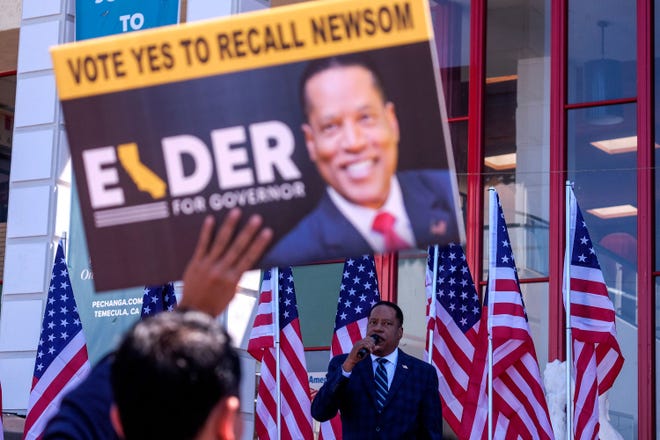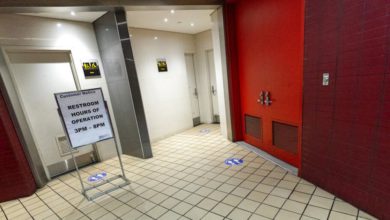
- Voters were asked two questions on their ballot: Should Gov. Gavin Newsom be recalled? If more than 50% of voters say yes, then the next question will be key: Who should replace him?
- The first polls in the state closed at 8 p.m. PDT and a flood of results are expected from mail-in ballots and early-in person votes.
- Only twice in U.S. history has a governor been removed from office via recall; in North Dakota in 1921; and in California in 2003.
LOS ANGELES — The polls in California's recall election have closed, capping off a historic 18-month effort that has Gov. Gavin Newsom's fate hanging in the balance.
It's been a winding path to get here, but recent polls showed the first-term Democrat is likely to keep his job leading the nation's most populous state, which is known nationally as a liberal trendsetter. Polls closed at 8 p.m. P.T.
The first results expected to be released are from early in-person voting and mail-in ballots, both of which have historically skewed liberal. The votes will likely give Newsom an early boost, but final results could stretch days or weeks. California historically takes weeks to count all the votes in statewide elections.
Regardless of the result, the election itself is both rare and historic. A Newsom recall would potentially send shockwaves across the country and throughout the Democratic Party.
Only twice in U.S. history has a governor been removed from office via recall; in North Dakota in 1921; and in California in 2003, when Gray Davis was removed and replaced by Arnold Schwarzenegger.
Everything you need to know:California's recall election of Gov. Gavin Newsom is Tuesday. Here's what's at stake.
On the eve of the election, Newsom got a boost from President Joe Biden, with the commander in chief telling voters at a campaign rally that the "eyes of the nation are on California." Biden warned Monday in Long Beach, California, that removing the first-term governor would carry consequences that would reverberate around the nation and risk returning to the "dark, destructive, divisive politics" of former President Donald Trump.
Meanwhile, Republican frontrunner and conservative radio host, Larry Elder, labeled by Biden as a "Trump clone," predicted victory.
“Make sure you have your friends vote, vote, vote, and try and get 10 more friends to vote and hit every call, make every call, knock on every door, we’re gonna win this thing if we turn out the vote,” Elder said this week.

How the California recall works
Voters were asked two questions on their ballot: Should Newsom be recalled? If more than 50% of voters said yes, then the next question was key: Who should replace him?
Forty-six candidates appeared on the ballot. Elder has consistently been leading polls among those vying to replace Newsom. He will be stationed Tuesday in Costa Mesa, California, about 40 miles south of Los Angeles, with supporters.
California recall:Voter fraud claims create 'circus-like atmosphere,' stir California recall of Gov. Gavin Newsom
Other prominent Republican candidates running include Caitlyn Jenner, a former Olympic gold medalist who starred on the reality series "Keeping Up with the Kardashians"; former San Diego Mayor Kevin Faulconer; California Assemblyman Kevin Kiley; and John Cox, a businessman who was easily defeated by Newsom in the 2018 gubernatorial election.
The only leading Democratic candidate who has emerged in the race is Kevin Paffrath, a real estate broker and YouTube personality.
When should we expect final results?
Polls in the state closed at 8 p.m. PDT and a flood of results are expected from mail-in ballots and early in-person votes. About 37% of the roughly 22 million ballots sent to California voters had been returned as of Monday, according to an analysis from Political Data Inc.
Democrats had returned a larger share of those ballots than Republicans, meaning early results could show good signs for Newsom. But that might not last and the number of voters who turn out Tuesday will likely be crucial in deciding the race.
California historically takes weeks to count all the votes in statewide elections. In 2020, when nearly 18 million people cast ballots, a third of the votes in the presidential election were counted after election night. Two years earlier, more than 40% were counted after Election Day.
'All on the same team':California Republicans skip endorsement fight in September recall election of Gov. Gavin Newsom
Opinion:California recall election is disaster for democratic values, threatens nation
Mailed ballots can arrive up to a week after Tuesday and still be counted, as long as they are postmarked by Sept. 14. This process can take days or weeks. Mail ballots are generally counted in the order they are received, so the last ballots to be counted tend to be the last ones to arrive.
In 2020, Republicans were much less likely than Democrats to vote by mail in part because Trump repeatedly claimed that voting by mail was unsafe and susceptible to fraud.
If that trend continues, the results in the recall election could swing back and forth on election night, depending on which types of votes are being reported – mail ballots or in-person votes.
Most California voters cast their ballots by mail, a trend that accelerated during the pandemic as many voters were reluctant to enter crowded polling places on Election Day. About 87% of California voters cast their ballots by mail in last year’s presidential election.
For Tuesday’s election, all 22 million registered voters were sent a mail ballot.
Mail ballots take longer to process than in-person votes because election officials must remove the ballots from envelopes, check the voter’s registration and make sure that the voter’s signature on the envelope matches the one on file. Then the votes can be counted.
When voters cast ballots in person, officials perform security measures at the polling place so the votes can be counted soon after the polls close.
But there have been unfounded claims of voter fraud and at least one Republican candidate in the race has refused to say whether he will accept the results of the race.
In recent days, Elder suggested the results of the recall election could be skewed by unspecified “shenanigans,” echoing Trump’s baseless claims of voting fraud in his 2020 race with Biden. He refused multiple times to say he would accept the results of the race in various interviews.
There has been no confirmed evidence of widespread fraud.
The Elder campaign's website has linked to a “Stop CA Fraud” site where people can sign a petition demanding a special legislative session to investigate the “twisted results,” well before any results were announced.
Newsom said he would accept the election results and urged Elder and others to do the same. “As an American, I’m ashamed. I’m disgusted by it. Stop. Grow up. These people literally are vandalizing our democracy and trust in our institutions,” he said.
Asked to provide evidence of any suspicious voting activity, Elder spokeswoman Ying Ma said the campaign wants “every proper vote to be counted” and “whatever shenanigans there are will not stand in the way of him becoming the next governor.”
What are voters saying?
The campaign to recall Newsom largely centered on his COVID-19 policies. He was applauded at the start of the pandemic for being the first to shut down a state over the virus.
Months later, California became the epicenter of the COVID-19 outbreak, despite the governor employing some of the strictest mandates in the country. Critics said he was heavy-handed, shuttering businesses and keeping children out of classrooms for longer than necessary. Newsom said his actions saved lives.
"I am angry. It should be a freedom of choice. What is this? A dictatorship?” asked Janet Webb, a 69-year-old Lafayette, California, resident who voted for Elder.
She said squabbles over Newsom’s handling of the pandemic have split her family and friends and may prompt her to move out of state.

“I can’t live here like this if they’re going to force everyone to get a vaccine,” Webb said.
Briana Mendoza, 30, said the last thing California needs is more turmoil. She voted to keep Newsom.
“We’re in the middle of a pandemic. Why would we recall the governor who has been really trying to curb the spread of the virus?” the San Diego social worker said.
Mendoza does not believe Newsom brought the recall upon himself by attending a birthday party at The French Laundry, an upscale Napa Valley restaurant, last fall in violation of his own administration’s coronavirus rules. Instead, she thinks the effort to unseat him is a backlash by a small minority of Republicans in a firmly Democratic state.
“We don’t want Elder in office,” she said. “This is ridiculous. We just got Trump out. We don’t want a Trump puppet.”
Voters' priorities split along party lines
Exit polls show COVID-19 was the top issue for voters, followed by homelessness, the economy, wildfires and crime.
The exit poll, conducted by Edison Research for several media outlets, found about a third of voters listed COVID-19 as the top issue in determining how they voted.
But the issue split along party lines: More than four in 10 Democrats said COVID-19 was their top issue, compared to about one-fifth of Republicans. Conversely, Republican voters were more than three times as likely as Democrats to list the economy as their top issue.
Voters offered mixed reactions to the pandemic’s current trajectory in California, with about four in 10 saying the situation is improving, three in 10 saying that it remains about the same, and just under one-quarter saying that it's getting worse.
The findings largely align with recent polling regarding voters' top priorities. In a recent poll from the Public Policy Institute of California, COVID-19 again topped the list of issues important to the state’s voters.
Contributing: Tom Coulter, The Desert Sun; The Associated Press
Source link











